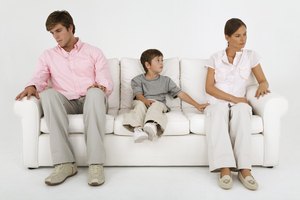90 Day Cooling Off Period for a Divorce in Pennsylvania
By Elizabeth Rayne, J.D.

Jupiterimages/Goodshoot/Getty Images
Pennsylvania requires a 90-day "cooling off" period for no-fault or "mutual consent" divorces, which provides an estranged couple the opportunity to resolve existing differences and salvage the marriage. If the husband and wife cannot resolve their disagreements in that time period, in most cases, a divorce decree can be issued by the court.
Grounds
Pennsylvania recognizes both fault and no-fault grounds for divorce. Fault divorce occurs when one party is considered "innocent and injured," while the misconduct of the other party caused the marriage to dissolve. Pennsylvania law provides limited grounds for fault divorce, including violence, adultery, bigamy, desertion, insanity or conviction of a crime. Alternately, Pennsylvania courts may issue a no-fault divorce. Under a no-fault divorce, neither party need show misconduct. A no-fault divorce can be sought by one spouse or by agreement of both spouses. When only one party wants a divorce, the couple must be separated for at least two years before the state will allow for a divorce.
Mutual Consent
Under a mutual consent divorce, where both parties agree that the marriage is irrevocably broken, Pennsylvania requires a 90-day waiting period. One party must serve the other party with a complaint for divorce, which triggers the start of the 90-day waiting period. Both parties may then file an affidavit consenting to divorce.
Purpose
The 90-day cooling off period gives the parties a chance to make sure the marriage is irrevocably broken and cannot be salvaged. In cases of mutual consent, the parties are not required to live separately during the 90 days. During this period, either spouse may request that the court order the couple to attend counseling sessions with a qualified professional. The husband and wife can also use this time to create a written settlement agreement to work out child custody, property and support issues.
After the Waiting Period
After the 90-day cooling off period is over, the parties are generally granted divorce by the court. The parties must consent, via Affidavits of Consent, and file the affidavits with the court. The parties can submit a Separation Agreement, which sets out how the couple has agreed to separate property, custody and support and similar issues. If the parties have not agreed on the terms of the separation, the court may set a hearing to decide these issues. In some cases, if both parties agree, the court may issue a divorce before the final determination of the terms of separation.
References
Writer Bio
Elizabeth Rayne earned her J.D. from Penn State University and has been practicing law since 2009, advising clients on issues ranging from employment law to nonprofit management. For two years, she served as a contributing editor for the "Vermont Environmental Monitor."